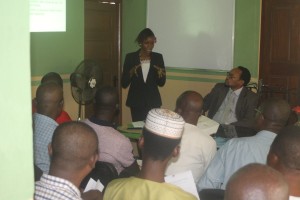
The roll call of attendance at the launch include the traditional rulers and representatives of slum and informal communities such as Otto-Ilogbo, Toluwani, Ifeoluwa, and Ifesowapo communities in Ebute-Metta local government area (LGA); Ajeromi, Badia-East in Apapa LGA; Otodo-gbame in Eti-Osa LGA; Atikporome, Araromi-Ale, and Mowo Phase2 communities in Badagry LGA. Leaders of community organizations working in these neighbourhoods also gathered in their numbers in solidarity with the campaign against mass displacement. They include and Rural and Urban Development Initiative (RUDI), the Landlords and Tenants Association of Balogun Street, Lagos Island Central Business District (CBD) and the Centre for Children’s Health Education, Orientation and Protection (CEE-HOPE).
With an estimated population of 21 million people, which is still increasing by 85 persons per hour, Lagos is beset with numerous urban planning and infrastructural challenges. Accompanying this record-high population growth in Lagos is an inflated demand for housing, water supply, sanitation, and other basic amenities. Entrenched inequalities in the distribution of land resources and urban infrastructure services continue to widen wealth disparities, constrain the supply of land and housing to the urban poor, leading to exponential increases in slum settlements across the state. Adopting forced displacement as a development control tool, state authorities have often used brute force to forcibly remove people living in the slums, occasioning homelessness, and systematic violations of fundamental internationally-recognized human rights.
In her opening remarks, SPACES FOR CHANGE S4C’ Executive Director, Victoria Ohaeri, shared the vision of the CAD initiative to offer a shared space for articulating the challenges around rapid urbanization and urban governance, while fostering collaboration needed to respond to them holistically. ”CAD offers a space for proper organization, for identification of challenges peculiar to communities, and for building channels of communication with city planning authorities. CAD will facilitate and enable a convergence and constructive interface between wealthy and poor, formal and informal, as well as the government and governed sectors of the state”, she said. S4C’s Aizighode Obinyan also drew attention to the enormity of infrastructural challenges Lagos State is facing–such as the the current housing deficit of 2.5 million–and the painful measures adopted by state authorities to remedy them.
Mrs. Betty Abah, the Executive Director of CEE-HOPE a civil society organization that focuses on children’ health education, orientation and protection, talked about the grievous impact, the too frequent displacements have on children. Some children never return to school after their parents are displaced. Once out of school, most young girls resort to hawking on the streets, where they fall prey to prostitution or early marriage while young boys become easy prey to street thuggery and a life of crime. Community representatives from Badagry, Toluwani, Badia, Otodo-gbame and Mowe Phase II, shared their own experiences, detailing the painful realities and harsh living conditions residents face in the aftermath of forced displacement: From one community to another, the stories of pain, despair, and hope for resettlement and justice, are almost uniform. Pastor Aworetan Olatunde from Badia lamented several lives lost since the September 2015 forced eviction and demolition of their community, with a recent loss in February, 2017 of Chief Aderemi Ilawole, a community elder. Badia was wrongfully demolished due to a failure of the democratic system in the country. Overnight, thousands of persons were made homeless by a few elite or connected citizens based on a court action which community members were not party to, and with no prior notice of eviction given to them as prescribed by law.
The highpoint of the meeting is the opportunity it offered to both ‘landowners’ and ‘occupiers’ on commonly-disputed land spaces, who hold traditionally-different viewpoints, to come together and have meaningful conversation around how to end the recurrent land tussles in the state. Mr. Niyi Ajayi of the Landlords and Tenants’ Association of Balogun Street expressed dismay at the perennial encroachment on landed properties, to the detriment of real estate investors. He cited the example of Balogun Street which has a mix of corporate and residential buildings. Today, these buildings are ‘empty of tenants’ despite the prohibitive annual Land Use Charge of N500,000.00 (Five Hundred Thousand Naira) plus other levies, taxes and maintenance fees which owners pay. Yet, landowners are left without security, traffic management and recurrents acts of trespass on their properties. The buildings remain empty and unattractive for rent because of the dense population of traders, squatters, traffic grid-lock, as well as inadequate security in the area. Another menace is the ‘area boy’ menace, that is, street thugs who collect rent illegally from trespassers, without recourse to the property owners or legitimate occupiers.
Conventional approaches are not solving these landlord-occupiers and state-community disputes rapidly enough and/or are too expensive for the poor and low-income groups to utilize. Not only that, there has been official reluctance to reform the policies and laws that lead to forced evictions or craft stronger legal remedies to those whose human rights have been violated. Few attempts at legal and policy reforms have for the most part, been bereft of the participatory infrastructure for enabling excluded groups take part in redefining policy priorities. Negotiating these complex issues is not easy. But one thing is certain: community organizations are not relenting, and are increasing their demands for a change in policy and concrete solutions to their most basic challenges of housing and improved urban livability. CAD has now stepped in to take good work to scale.




















